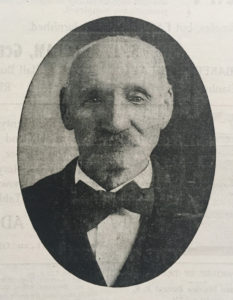
A FRUGAL LIFE OF TOIL.
Career of Mr. James Bowers a Most Commendable One. – A Brave Soldier in the Service of His Adopted Country, and a Faithful and Industrious Employee.
Another member of the famous “Boys’ Club”—Mr. James Bowers—is represented by an excellent likeness on our first page. Only one more of the party of old gentlemen who participated in the outing at Lake Griffith last June remains to be given representation in the MIRROR by portrait and sketch. The remaining one is Mr. Charles Hebert, and he has had no picture taken for many years.
Mr. James Bowers was born March 15, 1830, in the world-famed County of Killkenny, Ireland, and came to this country in 1850 with his parents, first taking up their residence in Whitehall, N. Y., where they resided till 1852, then coming to Danby and taking up their residence in “Scottsville.” Mr. Bowers’ parents were well along in life when they arrived in this country, and his father was able to do very little hard labor, thereafter during his lifetime. In the old country he followed agricultural pursuits, tilling leased land and working hard to eke out a livelihood for himself and family and to pay the annual rental to his landlord.
For a time after coming to Danby, James worked on the construction of the railroad bridges of the Western Vermont railroad, which was then being built through this valley. Leaving Scottsville, the Bowers family moved to the James Griffith house, at what is now the “South End,” and Mr. Bowers’ mother died there. The next move was to the house first beyond the stone store building at “Fishville,” now occupied by Mrs. U. L. B. Fuller, and which James subsequently became owner of. For several years, while the marble business was an important industry of the town, Mr. Bowers worked in the one or the other of the mills near his home.
In 1860 Mr. Bowers went to Arkansas and worked on the levees till the following year, when he went down into Indiana and was employed in a gas plant. On June 7, 1861, he enlisted at Vincennes, Ind., in the 14th Regiment of the volunteer infantry of that state. After serving two years and ten months with that regiment in the army, he was honorably discharged on account of sickness. This was in April, 1863, and in the following June he had so far recovered his health that he enlisted in the Reserve Corps and served through the war.
Mr. Bowers’ army life was a most active one, and besides participating in many minor engagements he was in the midst of the flying bullets, grape shot and cannon missiles of all kinds in the second battle of Bull Run, battles of South Mountain, Fredericksburg and Antietam.
After the close of the war Mr. Bowers returned to Danby, and a part of the intervening time till 1886 he worked for Mr. S. L. Griffith. In the year just mentioned he took a trip to Nevada for the purpose of visiting a brother who resided there. It was entirely a pleasure trip, and he was absent about six months, during which time he visited many points of interest in that vicinity, including Lake Terro, one of the greatest wonders of that section at that time, and located in the Nevada mountains. This lake rolls with whitecaps on the calmest day, and navigation is accompanied by much danger. Mr. Bowers made a tour of the lake in a mail boat, which kept close to the shore for safety.
Returning to Danby from his visiting trip, Mr. Bowers again entered the employ of Mr. Griffith, and worked for him and Griffith & McIntyre about seventeen years altogether. For a large part of the time while thus employed he had charge of two derricks at the depot, which were kept busy in loading charcoal into the cars for shipment.
During all of his lifetime, up to about five years ago, when he gave up active labor, Mr. Bowers has been a hard-working, industrious man and a respected and valuable citizen to the community. He now resides with his sister, Mrs. Mary Kane, where his latter years are made as comfortable as possible. By virtue of his service for the country of his adoption, he now draws a liberal pension. His general health is as good as might be expected at his time in life and after so many years of almost continuous toil.
In 1868, Mr. Bowers married the widow of the late Henry Stultz, with whom he lived for eighteen years, or until her death in March, 1881. No children resulted from the union, but besides his sister, Mrs. Kane, Mr. Bowers has a brother still living in Nevada; and he also had another brother who died some twenty-seven years ago in Connecticut. He also has a number of nephews and nieces and grandnephews and grandnieces, who hold much love for their “Uncle James.”